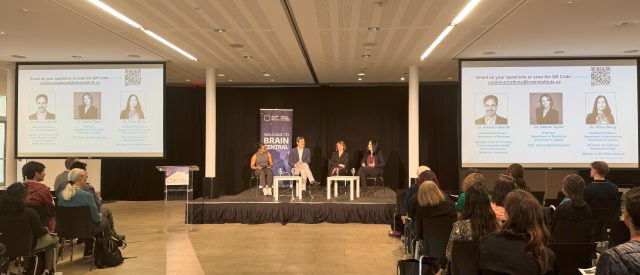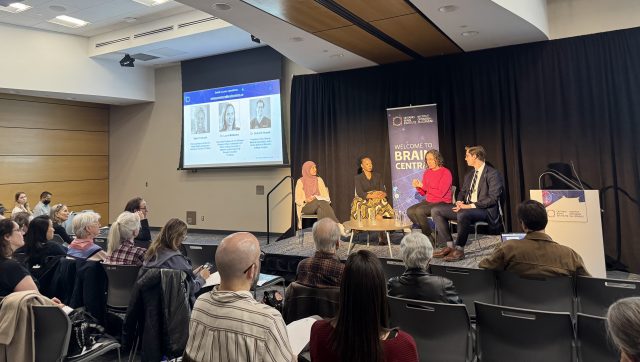Knowledge is an important resource that can be used to affect behaviour and cause positive change. OBI’s Outreach initiatives focus on harnessing what we know to: tell stories, build community, connect evidence and care, and evaluate our work – all to make an impact on brain health in Ontario.
Powerful as it may be, knowledge can fall short of its potential, if it’s not used with the right tools to enable its implementation. A famous story in the history of knowledge translation describes thecase of scurvy and Dr. James Lind who is credited for pioneering the first clinical trial in the 1700s. Desperate to treat the scurvy that was claiming lives of sailors by the thousands, Lind split a group of a dozen of them into groups of two, giving each pair a different treatment – one of which included citrus fruits. The results were seen almost immediately and the dramatic findings led Lind to publish the Treatise on Scurvy in 1753. The evidence that a regular dose of oranges or lemons could treat scurvy was clear as day but it wasn’t until 1795 that the British Navy began introducing them into the daily diets of sailors.
What caused the 40-year delay? There were many factors that hindered the adoption of Lind’s evidence: competing theories, lack of dissemination, and the ineffectiveness of government action. Additionally, Lind himself advocated for an inadequate solution to get around the practicality issues of stocking ships with tons of fresh citrus fruits – he suggested boiling down citrus juice into thick syrup called “rob” without knowing that boiling the juice for many hours would severely reduce the amount of vitamin C in the concentrate.
As demonstrated by this famous case, research alone can only take us so far – the power of knowledge lies in its ability to be disseminated and implemented effectively. Things have come a long way since the 1700’s but the general process of knowledge translation has yet to become impervious to the factors that can cause lag periods between the creation of knowledge and its adoption. Even today there are often barriers to implementing evidence to improve care.
What if there were simple guidelines that could facilitate the process of determining treatment options for complicated brain disorders? Clinical guidelines aim to steer decision-making around diagnosis and treatment of a patient so that doctors and other care providers are armed with the most current knowledge to consistently deliver the highest level of care.
In Ontario, a trail-blazing team has brought to light the most current information on the care of epilepsy through the publication of Provincial Guidelines for the Management of Epilepsy in Adults and Children.
The guidelines were developed by Critical Care Services Ontario in collaboration with the Epilepsy Implementation Task Force – a working group under Provincial Neurosurgery Ontario, composed of surgeons, specialists, primary care providers, administrators and community advocates; many of whom are members of OBI’s research program focused on epilepsy.
The guidelines are a work in progress with three of six now available for dissemination. Each of them tackles a key issue in epilepsy care where a real gap exists in optimal practice. One of the guidelines in progress tackles the issue of surgery for epilepsy, which could treat over 13,000 Ontarians who do not respond to epilepsy drugs. While surgery can give many patients a seizure-free life, presently less than two percent of people who could be treated by surgery actually access it. Another matter is the transition from childhood to adult care – a particularly challenging period for many people affected by chronic disorders. The guidelines focused on this issue will help care providers make the transition as seamless as possible for those living with epilepsy.
It’s still early days for this initiative – but the guidelines will help improve diagnosis and care of epilepsy across the province and beyond. This is an exciting start and OBI is actively looking for other areas within its research programs where new findings can be used to shape care practice. Opportunities are being explored to move knowledge to action in cerebral palsy and autism research.
Another way to create continual improvement in how we care for people is to evaluate what we know and what we do on a regular basis. In addition to undertaking its own evaluation activities to ensure that OBI continues to make positive impacts on the research, health, and the economy of Ontario, OBI has started a program to encourage others to evaluate their work too.
To help improve community-based services for people with brain disorders, the Evaluation Support Program links Ontario-based, not-for-profit organizations with evaluation specialists. Together, they develop and implement a plan to evaluate the delivery of one of the organization’s brain-related services, programs, or activities.
In 2015, OBI selected the following programs to work with evaluation specialists at the Centre for Community-Based Research and the Evaluation Centre for Complex Health Interventions:
Dancing with Parkinson’s which aims to demonstrate the efficacy and impact of their weekly dance program for people with Parkinson’s disease; the Epilepsy Support Centre which will examine best practices within their Game On program that helps children with neurological conditions develop their physical literacy skills; Epilepsy Toronto to evaluate their counseling services for people with epilepsy; The South West Alzheimer Society Alliance which seeks to evaluate their core services and how they can be improved to benefit their clients; and Suvien, that is evaluating how best to roll out their app for people with dementia .
Just as evidence informs clinical practice, OBI aims to encourage the use of evidence to inform how community-based services and supports are provided, allowing organizations to track what works best. This way, best-practices can be replicated and services can be improved to maximize their benefit.
One of the key learnings from the story of Dr. James Lind and the sailors is that connecting knowledge to meaningful action is equally as important as creating it. Whether it’s participating in the creation of clinical care guidelines, or supporting the evaluation activities of other organisations, connections lie at the heart of all of OBI’s Outreach initiatives. By connecting the people who create knowledge with those who act on it and govern its implementation we minimize the risk of having precious knowledge remain at sea. With an integrated system in place, knowledge is poised to make health impact faster.
Back to Brainnovations Newsletter



